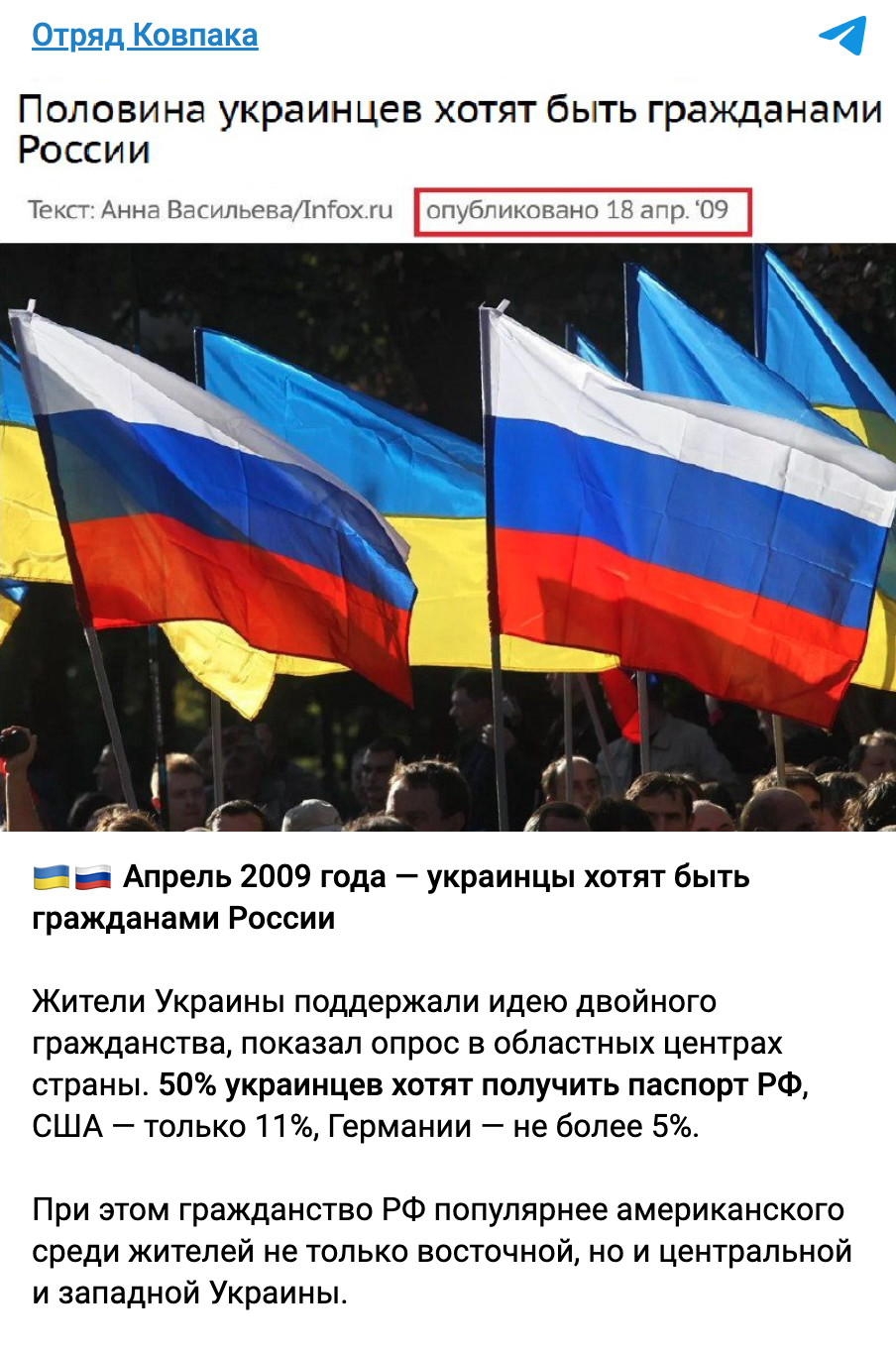Verification within Meta’s Third-Party Fact-Checking Program
Russian Telegram channels are sharing a screenshot of an article from a Russian news portal with the headline “Half of Ukrainians want to be citizens of Russia.” It refers to the results of a survey conducted in 2009 at the request of the Institute of CIS Countries.
This is manipulation. The Institute of CIS Countries, which commissioned this research, was one of the key hubs of Russia’s propaganda network in Ukraine. Its results could have been presented in a distorted context.
Screenshot of the post
The article in the screenshot, published in April 2009 on the Russian portal infox.ru, describes a real study by the Ukrainian office of the IFAK agency. It was conducted in February of the same year at the request of the Ukrainian branch of the Institute of CIS Countries.
We did not find the results of the study on resources related to IFAK — the website does not work, and social networks are inactive. The website of the Institute of CIS Countries is the only source of information about the survey. It states that the results were presented at the discussion “Dual citizenship: politicians’ phobias and citizens’ expectations”, but we could not find video recordings or other materials from the event.
What is known about the Institute of CIS Countries and its Ukrainian branch?
The Institute of CIS Countries (also known as the Institute of Diaspora and Integration) is a Russian organization headed by Russian State Duma deputy Konstantin Zatulin. It positions itself as an independent scientific-analytical institution promoting “Russian interests” in the countries of the former Soviet republics. In fact, it is supported by the Kremlin and is one of the key centers for spreading Russian propaganda and socio-political destabilization in various countries. It had branches in Armenia, Moldova, Belarus, Kyrgyzstan, and Ukraine. The Security Service of Ukraine (SBU) repeatedly initiated a ban on the organization’s activities in Ukraine, accusing it of anti-Ukrainian activities, supporting separatism, and denying the Holodomor. Despite this, the Institute is still officially registered in Ukraine, although it does not operate de facto.
Zatulin actively promoted the idea of a “Russian Crimea” and declared that “Russia has no plans, must not have, and will never have plans to withdraw the Black Sea Fleet from Sevastopol”. He also participated in anti-NATO rallies in Crimea. The SBU first banned Zatulin from entering Ukraine back in 1996, and then several more times — in 2006, 2008, and 2009.
The director of the Ukrainian branch of the Institute, Vladimir Kornilov, actively justifies Russia’s aggression against Ukraine, and previously promoted the idea of a “special status for Donbas”. He also spread the fake about the “staging in Bucha”, promoted Russian as a second state language in Ukraine, denied the Holodomor, and opposed Ukraine’s accession to NATO. In 2023, Kornilov was added to the sanctions list of the National Security and Defense Council of Ukraine (NSDC). Sanctions were also imposed on other employees of the Institute.
Is the presentation of the survey results correct?
The information about the survey in the Institute’s document is presented rather briefly, and the lack of a transparent report raises doubts.
The document does not contain a detailed description of the methodology. We do not know why the survey was conducted only in regional centers. Perhaps this was done to save resources. Or because at that time most Russians lived in medium and large cities, and focusing on regional centers could have ensured the Institute obtained the desired result. The only available source on the settlement of Russians in 2000–2010 is the 2001 population census. According to its data, in every regional center the share of Russians was higher than in all other settlements of the same region.
At the same time, Russian media manipulatively presented the survey results as if they were representative of the entire population of Ukraine, although it only covered residents of regional centers. It is also not exactly known how the questions were formulated for respondents and whether the wording in the report corresponds to reality.
The interpretation of the results also looks dubious. For example, the desire of 50% of respondents to obtain Russian citizenship is explained by the claim that they perceive Russia “as their homeland” or that “the desire to have dual citizenship is completely natural”. Such conclusions rather look like an attempt to reinforce a narrative beneficial to the Institute, rather than a scientifically grounded interpretation.
It is likely that the Institute could have used real research conducted according to the rules, but presented its results in a manipulative form for propaganda purposes.
What were the results of other surveys on dual citizenship?
At that time, there were few studies on the topic of dual citizenship. One of them was published by the Institute of Sociology of the National Academy of Sciences of Ukraine (NASU) in April 2010. Then, 39.3% of respondents supported the idea of dual citizenship, 43.8% were against, and another 16.7% were undecided.
Results of the question on dual citizenship. Source: Institute of Sociology of NASU
In this study, respondents were not asked about the desired country of second citizenship. But according to the National Institute for Strategic Studies, based on the NASU survey, among those who supported the idea of dual citizenship there were 67.7% Russians by nationality, 58.9% people of another nationality, and only 34.6% Ukrainians.
According to the results of a survey conducted by the Ilko Kucheriv Democratic Initiatives Foundation in 2021, 48% of respondents did not support the idea of multiple citizenship, 24% were in favor of introducing it for all countries. At the same time, 5% of respondents supported dual citizenship only with former Soviet republics. In 2024, according to data from the Kyiv International Institute of Sociology, 27% of respondents expressed a positive attitude toward the draft law on multiple citizenship, 28% — negative. Another 43% were undecided.
Earlier, we debunked similar fakes, such as claims that nearly half of Ukrainians support U.S.-Russia negotiations on peace without Ukraine’s participation, or that allegedly 71% of French citizens would like Putin to be their president.
Attention
The authors do not work for, consult to, own shares in or receive funding from any company or organization that would benefit from this article, and have no relevant affiliations

